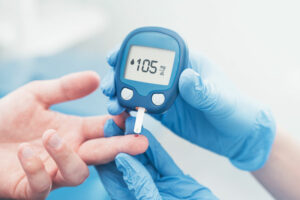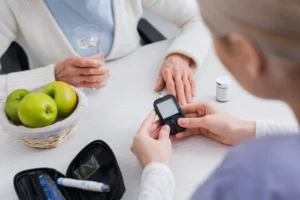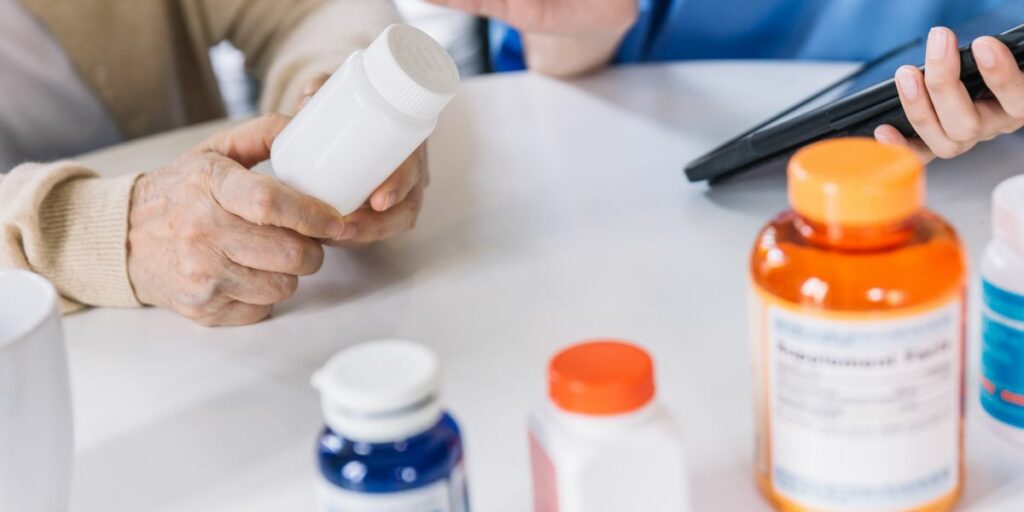Diabetes, a chronic condition affecting millions worldwide, necessitates vigilant management to maintain a healthy life. Among the array of treatment options, oral hypoglycemic agents (OHAs) play a pivotal role in controlling blood sugar levels, especially in Type 2 diabetes. This blog delves into the intricate world of oral hypoglycemic therapy, offering an insightful journey through its mechanisms, benefits, and considerations.
Contents
When Do You Give Oral Hypoglycemic?
 Oral hypoglycemic agents, also known as oral antidiabetics or oral hypoglycemic drugs, are medications used to treat high blood sugar levels in people with type 2 diabetes. These drugs are typically prescribed when lifestyle modifications such as diet and exercise alone are not sufficient to control blood sugar levels.
Oral hypoglycemic agents, also known as oral antidiabetics or oral hypoglycemic drugs, are medications used to treat high blood sugar levels in people with type 2 diabetes. These drugs are typically prescribed when lifestyle modifications such as diet and exercise alone are not sufficient to control blood sugar levels.
The decision to initiate oral hypoglycemic therapy is based on several factors, including:
- Blood Sugar Levels: Oral hypoglycemics may be necessary if a patient’s blood sugar levels remain consistently high despite lifestyle changes.
- Type of Diabetes: These medications are primarily used in type 2 diabetes. Type 1 diabetes, on the other hand, typically requires insulin therapy.
- Individual Patient Factors: The choice of a specific oral hypoglycemic drug depends on various factors, such as the patient’s age, kidney function, risk of hypoglycemia, and other health conditions.
- Patient Preference and Compliance: The ease of use, frequency of dosing, side effects, and cost of the medication can affect patient adherence and are considered when prescribing these drugs.
- Treatment Goals: The target blood sugar levels might vary depending on individual health conditions, and oral hypoglycemics can be adjusted to achieve these goals.
It’s important to note that oral hypoglycemic agents are part of a comprehensive diabetes management plan. This includes regular monitoring of blood sugar levels, dietary management, physical activity, and possibly other medications to address related health issues like high blood pressure or cholesterol. Regular follow-up with a healthcare provider is crucial to manage the condition effectively.
What Are The Oral Hypoglycemic Drugs?
Oral hypoglycemic drugs, used to treat type 2 diabetes, are classified into several categories based on their mechanism of action. Here’s a brief overview of these categories and some common examples:
- Sulfonylureas
These drugs stimulate the pancreas to produce more insulin. Examples include Glipizide, Glyburide, and Glimepiride. They are among the oldest diabetes medications but can increase the risk of hypoglycemia and weight gain.
- Biguanides
Metformin is the most commonly used drug in this class. It works by decreasing glucose production in the liver and improving insulin sensitivity. It is often the first medication prescribed for type 2 diabetes and has a low risk of causing hypoglycemia.
- Thiazolidinediones (TZDs)
These drugs, including Pioglitazone and Rosiglitazone, improve insulin sensitivity in muscle and fat. And also reduce glucose production in the liver. They are associated with risks such as weight gain and heart failure.
- DPP-4 Inhibitors
Drugs like Sitagliptin, Saxagliptin, and Linagliptin work by blocking the DPP-4 enzyme. It further results in prolonged incretin hormone activity, leading to increased insulin release and decreased glucagon levels. They have a low risk of hypoglycemia.
- SGLT2 Inhibitors
Canagliflozin, Empagliflozin, and Dapagliflozin work by preventing the kidneys from reabsorbing glucose back into the blood. This leads to reduced blood glucose levels and can also aid in weight loss.
- Alpha-glucosidase Inhibitors
Acarbose and Miglitol slow the breakdown of starches in the gut, helping to prevent sharp rises in blood sugar after meals. They are less effective in lowering blood sugar levels compared to other classes.
- Meglitinides
Repaglinide and Nateglinide stimulate the pancreas to produce more insulin but have a shorter action than sulfonylureas. They are taken before meals to control the rise in blood sugar after eating.
Each of these medications has its benefits and side effects, and the choice of medication is based on the individual’s specific health needs, tolerance, and the medication’s effectiveness in controlling their blood glucose levels. It’s important to work closely with a healthcare provider to determine the most appropriate medication or combination of medications.
What Are The Benefits Of Oral Hypoglycemia Therapy?
 Oral hypoglycemic therapy, which involves the use of oral medications to lower blood glucose levels, offers several benefits for individuals with type 2 diabetes. These benefits include:
Oral hypoglycemic therapy, which involves the use of oral medications to lower blood glucose levels, offers several benefits for individuals with type 2 diabetes. These benefits include:
Improved Glycemic Control
The primary benefit of oral hypoglycemic agents is their effectiveness in reducing high blood sugar levels. By doing so, they help prevent the acute symptoms of hyperglycemia and the long-term complications associated with uncontrolled diabetes. Such as neuropathy, retinopathy, kidney disease, and cardiovascular issues.
Reduced Risk of Diabetes-Related Complications
Consistent management of blood glucose levels with oral hypoglycemics can significantly decrease the risk of developing serious diabetes-related complications, including heart disease, stroke, kidney failure, and vision problems.
Convenience and Ease of Use
Oral medications are generally easier to administer compared to insulin injections. This convenience can lead to better adherence to the treatment regimen. This is crucial for effective diabetes management.
Variety of Options
There are several classes of oral hypoglycemic drugs, each working in different ways to lower blood sugar. This variety allows healthcare providers to tailor treatment to the individual needs of each patient, considering factors like other health conditions, potential side effects, and the mechanism of action of the drug.
Weight Management
Some oral hypoglycemic drugs, such as GLP-1 receptor agonists and SGLT2 inhibitors, can have beneficial effects on weight loss or weight management, which is particularly advantageous for many individuals with type 2 diabetes who are overweight or obese.
Improved Cardiovascular Health
Certain oral hypoglycemics have been shown to positively affect cardiovascular health. For example, some SGLT2 inhibitors and GLP-1 receptor agonists can reduce the risk of heart attack, stroke, and heart failure in people with type 2 diabetes.
Enhanced Quality of Life
By controlling blood sugar levels and reducing the risk of complications, oral hypoglycemic therapy can significantly improve the overall quality of life for individuals with diabetes. It allows them to maintain a more normal lifestyle with fewer restrictions and health concerns.
Cost-Effectiveness
In many cases, oral hypoglycemic agents can be more cost-effective compared to other diabetes treatments like insulin therapy. Especially considering the long-term costs associated with the management of diabetes complications.
It’s important to remember that while oral hypoglycemic therapy offers many benefits, it is most effective when combined with lifestyle modifications. Ultimately, ongoing monitoring and support from healthcare professionals.
What Are Some Considerations In Oral Hypoglycemic Therapy?
 When prescribing and managing oral hypoglycemic therapy for diabetes, several key considerations must be taken into account to ensure effective and safe treatment. These considerations include:
When prescribing and managing oral hypoglycemic therapy for diabetes, several key considerations must be taken into account to ensure effective and safe treatment. These considerations include:
- Individualization of Treatment: Every patient’s diabetes is unique. So the treatment plan should be tailored to individual needs, taking into account the patient’s age, weight, lifestyle, the severity of diabetes, other health conditions, and personal preferences.
- Type and Severity of Diabetes: The choice of oral hypoglycemic agent depends on the type (usually Type 2 diabetes) and the severity of the condition. Some drugs are more suitable for the early stages of diabetes, while others may be more effective in the advanced stages.
- Risk of Hypoglycemia: Different oral hypoglycemic drugs have varying risks of causing low blood sugar (hypoglycemia). Medications have a higher risk compared to others. This risk is an important consideration, especially for patients who are elderly, have kidney impairment, or have a history of hypoglycemia.
- Potential Side Effects: Understanding the side effects of each medication is crucial. Patients should be informed about possible side effects and what to do if they experience them.
- Patient Education and Involvement: Educating patients about their condition, the importance of medication adherence, and lifestyle changes are essential. Involvement of the patient in decision-making can lead to better adherence and outcomes.
- Interaction with Other Medications: Considering potential drug interactions is important, as some oral hypoglycemics can interact with other medications. And, altering their effectiveness or increasing the risk of adverse effects.
By carefully considering these factors, healthcare providers can optimize oral hypoglycemic therapy for each patient. Then, helps to control blood glucose levels effectively.
Conclusion
In conclusion, oral hypoglycemic therapy plays a crucial role in managing type 2 diabetes by effectively lowering blood sugar levels. While these medications offer significant benefits, including improved glycemic control, reduced risk of complications, and enhanced quality of life, it’s important to tailor the treatment to each individual’s unique needs. Factors like the specific type of diabetes, potential side effects, other health conditions, and lifestyle choices all play a part in determining the most suitable medication.
Regular monitoring, patient education, and a holistic approach that includes diet and exercise are key to achieving the best outcomes. Ultimately, understanding and addressing these considerations can lead to more effective and safer diabetes management. Join our online diabetes treatment program and reverse Diabetes naturally through lifestyle changes such as a Personalized Diet plan, Exercise, Yoga, dieticians, and health coaches.

